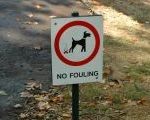 Go to main content
Go to main content
Archive Website of the UK government
Please note that this website has a UK government accesskeys system.
Main menu
Page menu
Home and community

Dog fouling

Dog mess is a nuisance and is associated with various diseases, including 'toxocariasis'. Dog owners should clean up after their dog in public places - you can report dog fouling that isn't cleaned up to your local council.
Complaining about dog fouling
Report a dog fouling problem

Connect direct to your council to report a dog fouling problem
Councils can order owners to clean up after their dogs in public areas like:
- parks
- recreation grounds
- children's playgrounds
- sports grounds
- tourist beaches and promenades
- picnic sites
- pedestrianised areas
- pavements
- verges
- footpaths
- gutters and carriageways
Your council has a legal duty to keep these areas clear of dog mess.
If you see fouling in these areas, report it to your local council. Check what the council's procedure is and confirm your complaint by letter or by filling in an online form. If possible, give details like the name and address of the offender or, if not, a description of the owner and the dog.
Some councils have stricter rules on dog fouling. They may require owners to carry a poop scoop and disposable bag when they take their dogs out to a public place. You can get further information on the rules in your area from your local council website.
The following link will take you to your council’s website where you can find out more.
Penalties for dog fouling
People who don’t clean up after their dog can be given an on-the-spot fine. The amount of the fine varies between different local authorities, but is often £50 and may be as much as £80.
If a person refuses to pay the fine, they can be prosecuted and may face a court appearance with a maximum penalty of £1,000. Registered blind dog owners are exempt from penalties.
Dog fouling and health risks
Some dogs may carry bacteria and worms that might be present in dog faeces. Some of them, like toxocara canis, can cause disease or infections in humans.
Toxocara canis is a roundworm found in dogs. Roundworm eggs are found in dog faeces, which can easily be picked up by young children and can cause the disease toxocariasis. This causes stomach upsets, sore throats, asthma and, in rare cases, blindness. The eggs can remain active in the soil for many years, long after the dog mess has weathered away.
To prevent dogs from carrying this and other worms, owners should worm their dogs regularly following the advice of their vet.
Advice for dog owners
If your dog fouls in a public place, you must clean up the mess under the Dog Act 1996. Always carry a poop scoop, which is a specially designed plastic shovel, or a bag to carry the mess to a dog bin. If there isn't a dog mess bin, take it home and dispose of it there.
Dog owners should not allow their pets to foul at random in public areas. Toilet training at puppy stage helps. If possible, you should encourage your dog to use your garden - you can then either bury the mess or flush it down the toilet. Do not put dog mess in green garden waste bags or rubbish bins.
 Facebook
Facebook Twitter
Twitter StumbleUpon
StumbleUpon Delicious
Delicious Reddit
Reddit